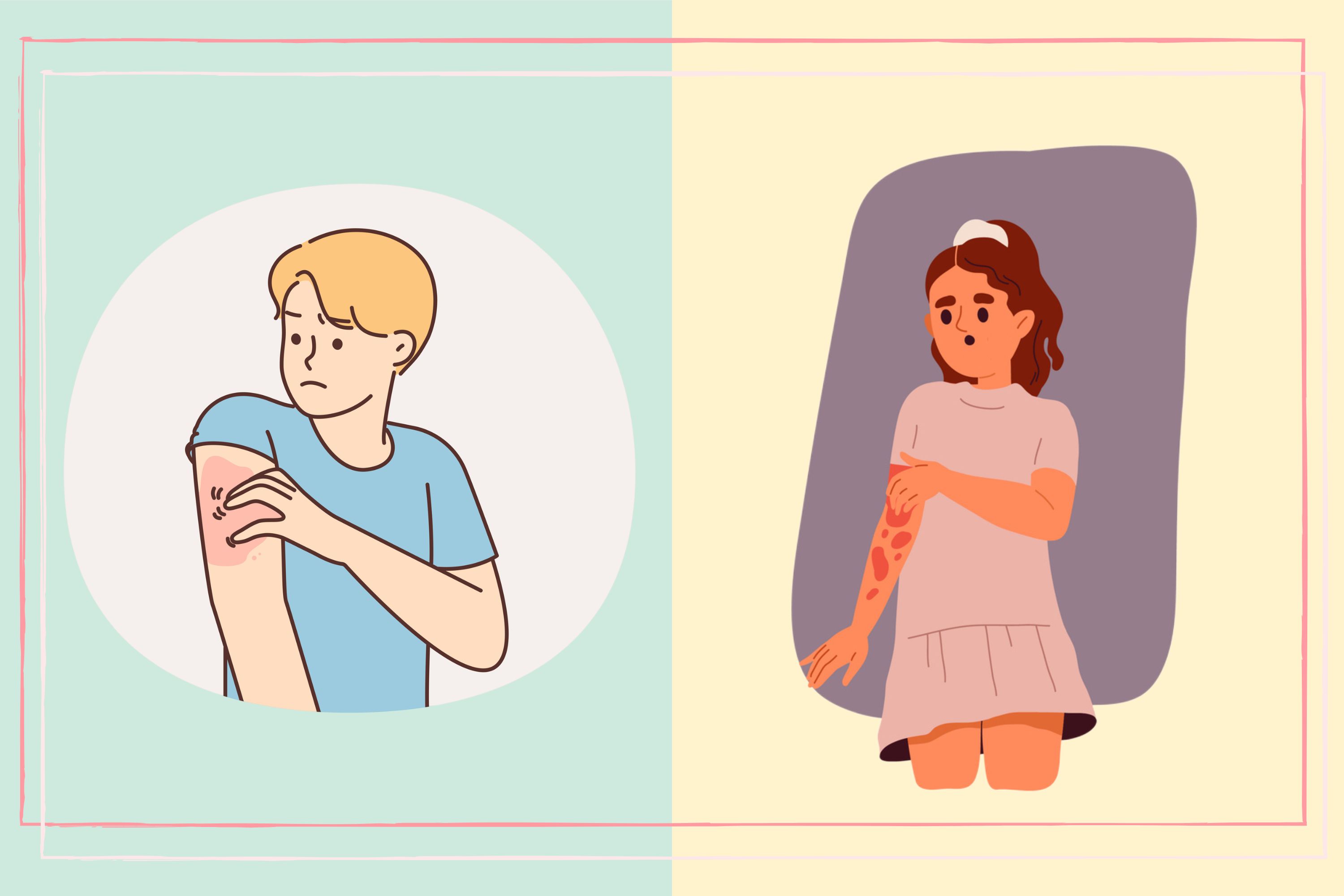Doctors answer your frequently asked questions about shingles in children, from is shingles contagious to how long does it last
We spoke to three doctors for advice on what to do if your child gets shingles, and they answered some of the most common questions about shingles in children


Shingles in children is rare, making it all the more important to get advice from your GP as soon as possible if you think your child has it.
Shingles is an infection caused by the varicella-zoster virus, which is the same one that causes chickenpox. However, while chickenpox is a well-known childhood illness and very common for kids under ten years old, shingles is very rare in children. According to Dr José Costa, a senior consultant paediatrician specialising in children’s allergies, roughly 75% of shingles cases occur in people over 45 and, as such, the NHS launched a shingles vaccine programme for the over-65s.
As well as speaking to Dr Costa, we also consulted Dr Catherine Fernando, a GP with a special interest in dermatology, and Dr Geeta Yadav, a dermatologist, for this article and the three doctors shared their best evidence-based advice on shingles in children, as well as answering some frequently asked questions about the infection that causes a rash on the body.
The information in this article is for general purposes only and does not take the place of medical advice. It is essential to be guided by your GP and you should immediately seek medical attention if symptoms are lingering for a long time, worsen or spread to near the eye, as well as if your child is already immunocompromised. If you are unsure how to manage your child’s shingles - or you’re concerned about their symptoms or a rash that has appeared - then it is crucial to seek personalised advice from a doctor as soon as possible.
Is there a difference between shingles in children and in adults?
"Shingles in children - as with adults - is the reactivation of the varicella-zoster virus," explains Dr Costa.
"The presentation in children is slightly different to adults," continues Dr Costa. "In adults it begins with a burning pain, itching and hyperesthesia - increased sensation - whilst in children, the rash tends to be mild and not painful. Clusters of small blisters appear in both cases."
Shingles usually follows a clear pattern. "The first sign may be itching or tingling of an area of skin," explains Dr Fernando. "This is followed by the development of a group of little red spots which quickly turn into fluid-filled blisters. The rash is present on only one side of the body, and over the next three to seven days new blisters form before gradually crusting over and completely healing." She adds that most children do not experience much pain during or after shingles, but post-herpetic neuralgia is a well-known, unpleasant complication in adults.
Parenting advice, hot topics, best buys and family finance tips delivered straight to your inbox.
A rash on both the left and right side of the body is unlikely to be shingles. If you are worried about your child and a rash that has appeared, contact your GP immediately.
Do you need to see a doctor for shingles?
Yes, you should see your GP or a doctor as soon as possible if you think your child has shingles.
Dr Fernando reassures that, "most healthy children do not require any special treatment." However it's important to get your child assessed by a doctor just in case, as Dr Fernando explains, "some groups of children do need antiviral - or acyclovir - therapy to prevent them becoming very sick. This can reduce discomfort and promote faster healing of the rash."
There are also specific groups of children and adults who should seek medical help urgently if they suspect they have shingles. "This includes children who have been treated with steroid tablets - for example asthma - within the preceding three months," says Dr Fernando. "Also, children who are immunocompromised." This includes underlying health conditions - mainly those affecting the immune system - and children with HIV or cancer, those undergoing chemotherapy, or others receiving treatment for childhood arthritis.
Dr Yadav warns, "If shingles occurs on the face or near the eye, that can be more serious and needs to be assessed by a doctor and an ophthalmologist." This also includes eye symptoms like redness, pain and a change in vision.
There are other scenarios when you should seek urgent medical advice. "If your child has a fever and looks unwell, or you are unsure if the rash is truly from shingles, it is best to take them to their GP," advises Dr Costa. Other worrying symptoms include the rash looking infected - including red, hot and painful characteristics - which may require a course of antibiotics. Additionally, hearing problems, breathing difficulties, severe headaches and pain long after the rash has disappeared should also be things to watch out for.
It is important to trust your instincts as a parent, and if you are at all worried about your child, you should speak to a doctor or your GP immediately.
What to do if your child gets shingles
The first thing you should do if you think your child has shingles is to seek advice from your child’s doctor. Once you have a diagnosis, the main thing parents can do is help ease a child’s shingles symptoms.
If your child gets shingles you should also inform others you have been in contact with who might not have had chickenpox in the past, or have not been vaccinated against varicella. You should keep your child away from certain groups of people while they have shingles, such as people with a weakened immune system (like someone having chemotherapy), anyone who is pregnant and newborn babies or babies under the age of one month old. You will also need to inform your child’s school that they have shingles and keep them at home until they are no longer contagious.
Try to encourage your child not to scratch to avoid the rash becoming infected. "The area should be kept clean as it heals," advises Dr Yadav. "Because the blisters can be tender, you may want to use cold compresses or colloidal oatmeal baths to relieve discomfort. Definitely don’t pop the blisters." The NHS recommends making a cool compress out of a bag of ice cubes or frozen vegetables wrapped in a towel or a wet cloth.
Dr Yadav adds that it’s a good idea to keep the blisters loosely covered - so dress your child in loose fitting clothing - as fabric with rough fibres can irritate the skin.
"If your child has no other underlying problems or shingles that doesn’t affect the areas around the face or eyes, the best option would be medication to help with the pain," suggests Dr Costa. Get advice from your GP on the best medication for your child. Dr Fernando warns that ibuprofen for shingles has been associated with a rare but serious skin condition, called necrotising fasciitis. Similarly, Dr Costa adds that aspirin should not be given to children under the age of 16, "do not give aspirin, as there is an increased risk of developing Reye’s syndrome - a rare condition that can lead to swelling of the tissues, including the brain."
Is shingles contagious?
You cannot get shingles from someone with shingles or chickenpox. However, you can get chickenpox from someone with shingles - so other children and adults could catch chickenpox from a child (or adult) with shingles if they haven’t had it before.
"Shingles is not caught from someone who has shingles or from someone who has chickenpox, so it would be extremely unlikely for several family members to get it at the same time," says Dr Fernando. "However, a person who has shingles can give chickenpox to someone who has never had chickenpox or hasn’t had the vaccine."
Can a child go to school with shingles?
No, a child with shingles should not go to school until they are no longer infectious.
"The varicella-zoster virus is highly contagious, and a child should not be at school with active shingles lesions - lest you put all of their classmates at risk of developing chickenpox," warns Dr Yadav.
Advice from the NHS reads: "Stay off work or school if the rash is still oozing fluid (weeping) and cannot be covered, or until the rash has dried out. You can only spread the infection to other people while the rash oozes fluid."
Siblings of a child with shingles can continue to go to school as normal provided they feel well and have no symptoms. "It is not necessary for other children from the same household to stay at home or isolate," says Dr Fernando.
How long does shingles last?
According to the NHS, it can take up to 4 weeks for the shingles rash to heal.
Even once the rash has healed, it can take a while for the discomfort caused by shingles to subside. "After they erupt, these blisters can last for a few weeks but the pain from them can last longer - well after the skin heals," notes Dr Yadav. "They aren’t usually itchy, but pain and burning is typically associated with the eruption."
Dr Costa advises that, "if symptoms have not resolved within 14 days, your child should be seen by their doctor" again.
Pregnancy and shingles
"Shingles during pregnancy does not pose any risk to the baby," says Dr Fernando.
"However, if you get shingles shortly before you give birth or in the days afterwards, try to protect your newborn from catching chickenpox by covering the rash and washing your hands often." You should also speak to a GP urgently for advice.
Dr Costa adds: "If a newborn catches it, in these cases they can develop neonatal chickenpox, which can be dangerous." Seek urgent medical advice in this instance. It is important to note that shingles cannot be spread to an infant through breast milk.
NHS advice on the topic of pregnancy and shingles states: "If you're pregnant and get shingles, it's mostly mild and there's usually no risk to you or your baby. But a GP should arrange for a specialist to advise on whether you need treatment."
Answers to your frequently asked questions about shingles in children
How long is a child contagious with shingles?
You can only spread the infection to other people while the shingles rash oozes fluid. "A person with shingles is infectious from the point of the first blister until all the blisters crust over," notes Dr Fernando. "This usually takes about a week."
Can you get shingles twice?
"It is possible to get shingles more than once," confirms Dr Fernando. "This is because it is not caused by repeated exposure to the virus, but a compromised immune system. Around 4% of patients will have a second episode, with three or more being rare. It is also possible to get it in more than one area of the body at the same time - but this usually only happens in immunocompromised people."
Why do some children get shingles and others don’t?
Shingles can occur in anyone who has had chickenpox or been vaccinated for chickenpox. "The virus lives dormant in your body until it is activated again," explains Dr Yadav. "The important distinction is that it is not activated by re-exposure - it flares up because your immune system has been weakened. In children, this can be due to another illness, including autoimmune conditions, medications that affect the immune system, or just being run down."
"Shingles may occur in a perfectly healthy child, but it is more likely to affect those who have a weakened immune system," says Dr Fernando. "A child's risk of shingles is increased if their mother had chickenpox during pregnancy, or if they had chickenpox as a baby."
Can a child with shingles go swimming?
No, a child with shingles should not swim or play any contact sport until the blisters from the rash have crusted or scabbed and they can no longer spread the virus.
Do parents have to isolate if a child has shingles?
This all depends on whether or not the parent has had chickenpox before. "Most parents who have had chickenpox in the past will not need to isolate from their children," says Dr Yadav. "If a parent was vaccinated with the varicella - chickenpox - vaccine as a child, they do not need to isolate from their child," she adds.
However, Dr Yadav adds: "If a parent is immunocompromised or pregnant - and they’ve not been vaccinated in the past or have never had chickenpox before - they may want to limit exposure to their child as they will be at greater risk of illness."
The information on GoodTo.com does not constitute medical or other health advice or diagnosis and should not be used as such. Although GoodtoKnow consults a range of medical experts to create and fact-check content, this information is for general purposes only and does not take the place of medical advice. Always seek the guidance of a qualified health professional or seek urgent medical attention if needed.
Our Experts

Dr José Costa is a senior consultant paediatrician, specialising in research and medical guidance on eczema, as well as childhood food allergies, hayfever and asthma. With over 16 years of experience in paediatrics and 12 years in paediatric allergy, he has worked in both the NHS and the private sector, as part of his own specialist Children’s Allergy Clinic.

Dr Catherine Fernando is a locum GP working across Scotland who recently received a diploma in practical dermatology from Cardiff University, where she graduated with distinction. She has also completed a paediatric scholarship for GPs and is the founder of a brand of sustainable medical bags for doctors, IYASU.

Dr Geeta Yadav is a dermatologist with experience of conditions such as rosacea, psoriasis, eczema, adult acne and skin cancer, as well as the treatment of skin of colour. She is a fellow of the Royal College of Physicians and Surgeons, the American Academy of Dermatology, and the European Academy of Dermatology and Venereology. Additionally, she teaches at the University of Toronto, and is the founder of FACET Dermatology.

Lauren is a freelance writer and editor, with more than eight years of experience working in digital and print journalism. She has penned news and features for titles including Women's Health, Daily Telegraph, Cosmopolitan, The Times, Stylist, The Guardian, Woman & Home, Dazed, The Sun's Fabulous, Yahoo UK and Grazia.
Lauren specialises in covering health and wellness topics—ranging from nutrition and fitness, to health conditions and mental wellbeing. She also runs a weekly newsletter called Well, Actually..., which has been named a Substack Featured Publication.